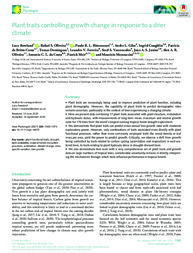Plant traits controlling growth change in response to a drier climate.
Plant traits controlling growth change in response to a drier climate.
Author(s): ROWLAND, L.; OLIVEIRA, R. S.; BITTENCOURT, P. R. L.; GILES, A. L.; COUGHLIN, I.; COSTA, P. de B.; DOMINGUES, T.; FERREIRA, L. V.; VASCONCELOS, S. S.; S. JUNIOR, J. A.; OLIVEIRA, A. A. R.; COSTA, A. C. L. da; MEIR, P.; MENCUCCINI, M.
Summary: Plant traits are increasingly being used to improve prediction of plant function, including plant demography. However, the capability of plant traits to predict demographic rates remains uncertain, particularly in the context of trees experiencing a changing climate. Here we present data combining 17 plant traits associated with plant structure, metabolism and hydraulic status, with measurements of long‐term mean, maximum and relative growth rates for 176 trees from the world?s longest running tropical forest drought experiment. We demonstrate that plant traits can predict mean annual tree growth rates with moderate explanatory power. However, only combinations of traits associated more directly with plant functional processes, rather than more commonly employed traits like wood density or leaf mass per area, yield the power to predict growth. Critically, we observe a shift from growth being controlled by traits related to carbon cycling (assimilation and respiration) in well‐watered trees, to traits relating to plant hydraulic stress in drought‐stressed trees. We also demonstrate that even with a very comprehensive set of plant traits and growth data on large numbers of tropical trees, considerable uncertainty remains in directly interpreting the mechanisms through which traits influence performance in tropical forests.
Publication year: 2021
Types of publication: Journal article
Unit: Embrapa Eastern Amazon
Observation
Some of Embrapa's publications are published as ePub files. To read them, use or download one of the following free software options to your computer or mobile device. Android: Google Play Books; IOS: iBooks; Windows and Linux: Calibre.
Access other publications
Access the Agricultural Research Database (BDPA) to consult Embrapa's full library collection and records.
Visit Embrapa Bookstore to purchase books and other publications sold by Embrapa.

